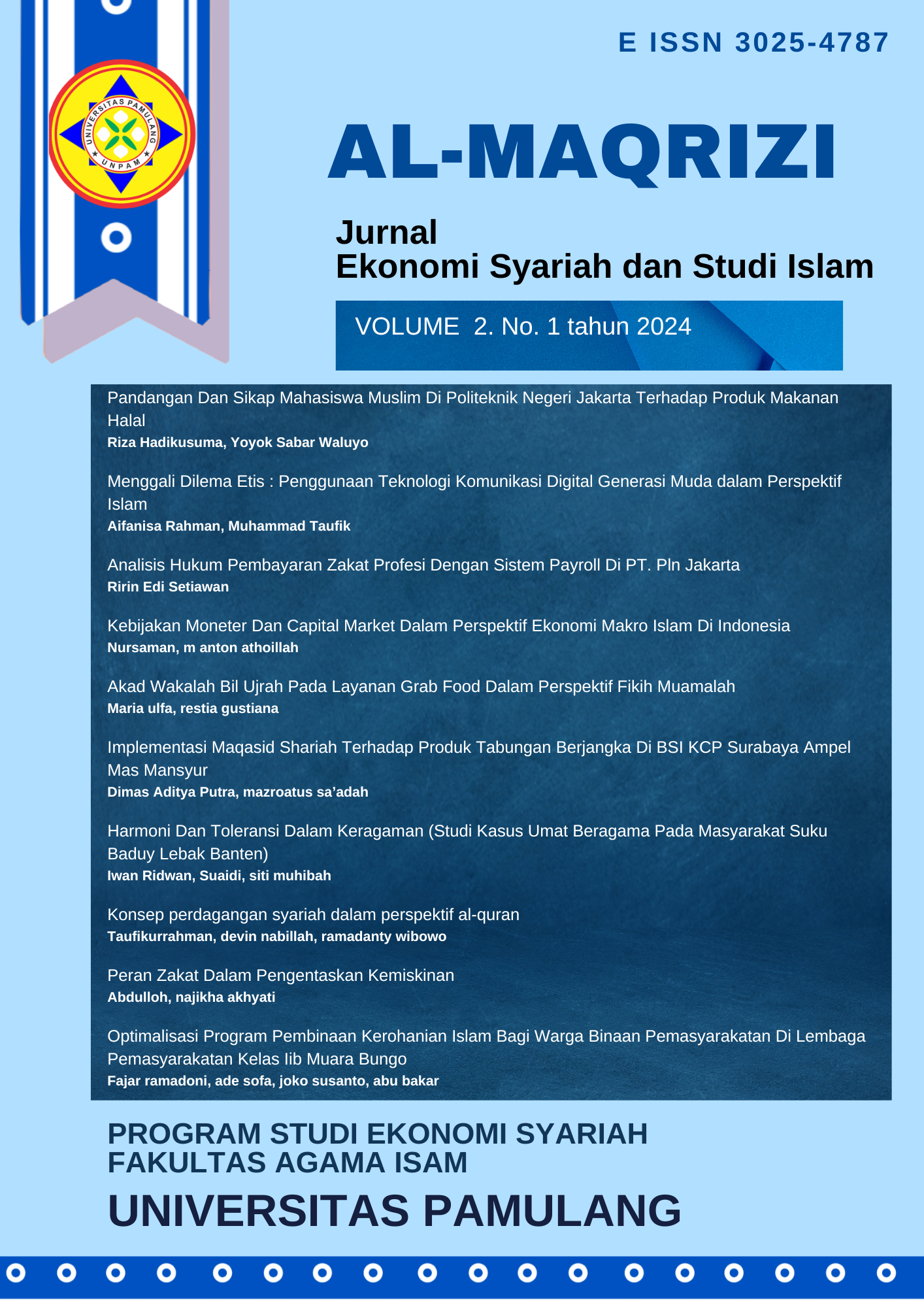Optimalisasi Program Pembinaan Kerohanian Islam bagi Warga Binaan Pemasyarakatan di Lembaga Pemasyarakatan Kelas II-B Muara Bungo
DOI:
https://doi.org/10.32493/amq.v2i1.41884Keywords:
Keywords: Optimization, Islamic Spiritual Development, PenitentiaryAbstract
This study aims to determine the optimization of Islamic spiritual formation programs,
inhibiting factors and efforts made to overcome obstacles in Muara Bungo Class IIB
Penitentiary. The method in this study is a descriptive qualitative method with a
population of all employees of Muara Bungo Class IIB Penitentiary and all prisonassisted residents, as well as an analysis unit totaling 13 people. This study used a
sampling method, namely purposive sampling. The results of this study show that the
optimization of the Islamic spiritual formation program has run according to the rules of
the Decree of the Director General of Corrections Number: PAS-10. OT.02.02 of 2021
concerning the inmate coaching assessment system. However, there are still inhibiting
factors in its implementation, namely the lack of human resources such as the lack of
coaching officers and the ideal conditions of security officers. In addition, the inhibiting
factor is also caused by excess occupancy capacity (over capacity) so that this has an
impact on limited facilities and infrastructure. To overcome these obstacles, the efforts
made by Muara Bungo Class IIB Penitentiary are to collaborate with external parties in
teaching staff assistance and socialization with an attitude and behavior change
approach, then to overcome this excess capacity, scheduling and coaching strategies are
carried out for fostered residents who are divided into groups. As well as conducting a
coaching assessment that is useful to facilitate the management of integration rights, in
this case parole which is a solution to reduce overcapacity.
Keywords: Optimization, Islamic Spiritual Development, Penitentiary.
References
Aghadiati, 2019. (2017). Tinjauan Pustaka Tinjauan Pustaka. Convention Center Di Kota
Tegal, 6–32.
Agustino, Leo. (2017). Dasar-dasar Kebijakan Publik. Bandung: Alfabeta.
Ajif, P. (2013). Pola Jaringan Sosial pada Industri Kecil Rambut Palsu di Desa
Karangbanjar, Kecamatan Bojongsari, Kabupaten Purbalingga. Jurnal Penelitian,
–40.
Ali. (2014). Metodologi dan aplikasi riset pendidikan (Suryani (ed.)). PT. Bumi Aksara.
Barlian. (2016). Metode Penelitian Kualiatatif dan Kuantitatif. Sukabina Press.
Camila, 2019. (2019). Metode Penelitian. Journal of Chemical Information and
Modeling.
Dahliyani, I. (2013). Pembinaan Keagamaan Pada Penderita Gangguan Mental Dan
Pecandu Narkoba. Mudarrisa, 1–28.
Dhimas,(2022). Optimalisasi Kinerja Basarnas Semarang Dalam Penanganan
Kecelakaan Laut Di Alur Pelayaran Pelabuhan Tanjung Emas Semarang. 6.
Dian, W. (2017). Metode Penelitian Metode Penelitian. Metode Penelitian Kualitatif, 17,
Fajar, A. N. (2019). Pola Komunikasi Komunitas Net Good People Bandung Dalam
Mempertahankan Eksistensinya Melalui Event Eksternal Di Bandung. 53–71.
Kamus Besar Bahasa Indonesia. (n.d.). Pngertian optimalisasi.
Moleong. (2018). Metodologi penelitian kualitatif. PT. Remaja Rosdakarya.
Narendra, (2022). Optimalisasi Kerja Cargo Oil Pump Turbine Di Mt. Nusa Merdeka.
Oliver, J. (2017). Evaluasi Bauran Promosi Dalam Meningkatkan Loyalitas Pelanggan
Claine. Journal of Chemical Information and Modeling, 53(9).
Pasolong. (2016). Teori Administrasi Publik.
Semiawan. (2010). Metode Penelitian Kualitatif. Grasindo.
Sihombing, R. (2020). Metode Penelitian. Metode Penelitian Kualitatif, 17, 43.
Sugiyono. (2019). Metode Penelitian Kuantitatif, Kualitatif, dan R&D. Alfabeta.
Triono R. (2019). Implementasi Kebijakan Perubahan Tata Ruang Pasar Tradisional Di
Kecamatan Maron Kabupaten Probolinggo. Reposity Universitas Panca Marga
Probolinggo, 12–38.
Utoyo, M. (2015). Konsep Pembinaan Warga Binaan Pemasyarakatan. Pranata Hukum,
(1), 37–48. Winarno, Budi. (2014). Kebijakan Publik (Teori, Proses dan Studi Kasus). Yogyakarta:
Buku Seru.
PERATURAN
Undang-Undang Dasar Negara Republik Indonesia Tahun 1945
Undang-Undang Nomor 22 Tahun 2022 Tentang Pemasyarakatan
Peraturan Pemerintah Nomor 31 Tahun 1999 Tentang Pembinaan dan Pembimbingan
Warga Binaan Pemasyarakatan
Peraturan Menteri Hukum dan Hak Asasi Manusia Nomor 35 Tahun 2018 Tentang
Revitalisasi Penyelenggaraan Pemasyarakatan
Keputusan Direktur Jenderal Pemasyarakatan Kementerian Hukum dan Hak Asasi
Manusia Nomor: PAS-10.OT.02.02 Tahun 2021 Tentang Sistem Penilaian
Pembinaan Narapidana.



